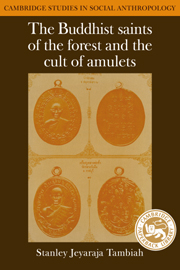Book contents
- Frontmatter
- Contents
- Acknowledgments
- Note on transcription
- 1 Introduction and manifesto
- Part I The arahant and the Path of Meditation
- Part II The hagiography of a Buddhist saint: text and context; the politics of sectarianism
- Part III The cult of amulets: the objectification and transmission of charisma
- Part IV Conceptual and theoretical clarifications
- 20 A commentary on millennial Buddhism in Thailand and Burma
- 21 The sources of charismatic leadership: Max Weber revisited
- 22 The objectification of charisma and the fetishism of objects
- Notes
- Index
- CAMBRIDGE STUDIES IN SOCIAL ANTHROPOLOGY
21 - The sources of charismatic leadership: Max Weber revisited
Published online by Cambridge University Press: 10 December 2009
- Frontmatter
- Contents
- Acknowledgments
- Note on transcription
- 1 Introduction and manifesto
- Part I The arahant and the Path of Meditation
- Part II The hagiography of a Buddhist saint: text and context; the politics of sectarianism
- Part III The cult of amulets: the objectification and transmission of charisma
- Part IV Conceptual and theoretical clarifications
- 20 A commentary on millennial Buddhism in Thailand and Burma
- 21 The sources of charismatic leadership: Max Weber revisited
- 22 The objectification of charisma and the fetishism of objects
- Notes
- Index
- CAMBRIDGE STUDIES IN SOCIAL ANTHROPOLOGY
Summary
Max Weber assigned charismatic leadership and domination a significant role in history because of his belief that charisma is the source of all creative leadership and that no form of political order can work without an element of charisma. As Mommsen remarks: “This is in line with Weber's own personal convictions regarding the role of the individual in history. Weber's charismatic personalities have much in common with Nietzsche's great individuals who set new values for themselves and for their followers, in an attempt to elevate mankind to a high level.” Indeed, Weber's view that charismatic leadership was necessary in modern “plebiscitarian democracy” was linked with his lack of conviction in the efficacy of popular sovereignty as such. Great politicians with charismatic quality were essential to keep democracy alive in spite of and in the face of bureaucratic institutions. He saw the need for society to be kept open to enable the rise and recognition of talented politicians with a sense of calling and with the capacity to resist the omnipotence of bureaucracies.
Precisely because charismatic leadership was so important in Weber's sociological theory of the modes of social action, it is both intriguing and puzzling that his discussion of it was plagued by certain dualities and even seemingly antithetical propositions. Weber took the notion of charisma from the Bible. Charisma is referred to in the New Testament, notably in two letters of Saint Paul, namely Romans 12 and I Corinthians 12. The King James Bible renders the Greek word charisma as “gift”; the “gifts” referred to in particular are those of wisdom, knowledge, healing, prophecy, ministry, and teaching. All these are seen as gifts of the Spirit, the Holy Spirit who speaks through Christ.
- Type
- Chapter
- Information
- The Buddhist Saints of the Forest and the Cult of Amulets , pp. 321 - 334Publisher: Cambridge University PressPrint publication year: 1984
- 1
- Cited by



